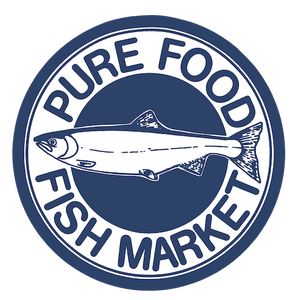FRESH BLOG
For all things Fresh Seafood, cooking inspiration, and more!

How Eating Fish Helps Improve Cardiovascular Health
A continued rise in heart disease and other serious cardiovascular issues has renewed a focus on how to improve cardiovascular health. Just how widespread are these types of heart health conditions? Nearly 30% of Americans suffer from complications due to poor cardiovascular health and heart disease remains the leading cause of death worldwide. Additionally, the overall occurrence of obesity and other issues that seriously affect cardiovascular health is increasingly prevalent in younger generations.
The risks associated with poor cardiovascular health have prompted more people to explore new dietary options. In fact, nearly 45 million Americans use diet plans each year to help with weight loss and fitness goals. Current dietary and wellness trends have popularized meat alternatives and gotten many more people interested to discover foods that are good for cardiovascular health.
This article will highlight some of the most prevalent cardiovascular disorders and present simple ways to improve cardiovascular health. We’ll also discuss the science behind why fish should be added to any dietary plan for a healthy heart, and some popular ways that fish can be prepared and enjoyed.
Common Cardiovascular Ailments and Causes
Complications due to poor heart health affect over 30% of all Americans. While some of the most common cardiovascular issues are caused by preexisting conditions, many heart problems are the result of dietary and other related lifestyle choices. These heart conditions often have multiple contributing factors, not one single cause.
Deteriorated cardiovascular health can also affect much more than just the heart, depending on the severity of the condition. These resulting negative effects, called comorbidities, often exacerbate the symptoms of the primary condition. Not addressing these related conditions can quickly reduce an individual’s quality of life and mental health.
Although their respective causes vary, the following list includes some of the most common cardiovascular issues:
- Metabolic syndrome
- Coronary artery disease
- Angina
- Myocardial infarction
- Valve disease
- High blood pressure
Common lifestyle and dietary factors contributing to these conditions include the following:
- Stress
- Poor diet (high in sugar, high in inflammatory foods)
- Lack of exercise
- Bad sleep habits/continual exhaustion
- High cholesterol
- Obesity
- High blood sugar
- Alcohol and tobacco consumption
These lifestyle habits negatively impact heart health by causing arteries to narrow or become clogged (atherosclerosis), significantly increasing blood pressure, spiking blood sugar levels, and more.
Fortunately for those wondering how to improve cardiovascular health, simple changes to diet and exercise can help slow, and in some cases reverse, the effects of poor heart health. One study from the Preventative Medicine Research Institute showed that significant lifestyle changes improved “blood flow to the heart and its ability to pump normally improve in less than a month, and the frequency of chest pains fell by 90% in that time.” This is great news for those wanting to improve their cardiovascular health.
Ways to Improve Cardiovascular Health
There are numerous ways to improve cardiovascular health, but any successful method relies on a proper balance of diet, exercise and other simple lifestyle habits. The top recommended ways to improve cardiovascular health include:
- A well-rounded diet that incorporates high amounts of dark leafy greens, lean proteins like fish, healthy fats and low-sugar fruits. Foods that are good for cardiovascular health will also provide anti-inflammatory properties and critical vitamins and minerals like vitamin K, vitamin B6, vitamin D, Potassium, Magnesium, and Omega-3 fatty acids.
- Mild to moderate exercise that elevates the heart rate for several minutes continuously. Even a simple exercise routine comprising brisk 30-minute walks each day will help improve circulation and reduce blood pressure. Another common recommendation is to avoid sitting for long periods of time (more than 60 minutes) without standing and walking.
- Limiting the practice of potentially harmful behaviors like excessive alcohol or tobacco consumption and erratic sleeping patterns.
- Following dentist-recommended practices for good oral health to help prevent infection that can result in periodontal disease (significantly increasing the chance of a heart attack).
- A low-stress lifestyle or stress reduction techniques that incorporate mindfulness practices like yoga or meditation.
Foods that Improve Cardiovascular Health
While it might seem overwhelming to attempt a complete dietary change, small changes can make a big impact and foods that support heart health can be found in most major grocery stores. The widespread availability of these foods makes them easy to add to a regular grocery shopping routine. The top foods that are good for cardiovascular health include:
- Whole grains
- Raw vegetables (high in fiber)
- Fish
- Greens
- Low-sugar berries
- Nuts/legumes like almonds and walnuts
- Avocados
- Dark chocolate
- Seeds (chi/flax seeds)
- Garlic
There are also foods that should be avoided due to their high content of unhealthy fats, processed sugar, harmful cholesterol and more. These foods are often unhealthy due to how they are prepared or their reliance on artificial flavors and additives for preservation.
Foods to avoid:
- Fried foods (e.g. fried chicken, deep fried vegetables)
- Highly processed foods (e.g. frozen pizza, microwave popcorn)
- Foods that are high in trans fats (e.g. margarine, shortening)
- Alcohol
- Tobacco
Benefits of Eating Foods that are Good for Cardiovascular Health
Following dietary recommendations to improve cardiovascular health has huge benefits beyond just the positive impacts to your heart. Eating healthy foods can help with all of the following wellness priorities:
- Reaching and maintaining weight loss goals
- Sharper memory and cognitive functions
- Improved digestive health
- Better joint health
- Reduced risk of cancer
- Better moods and emotional stability
How Eating More Fish Helps Improve Cardiovascular Health
Fish offers a wide variety of health benefits in addition to its delicious flavor. Understanding the science behind why eating fish supports heart health and knowing which breeds of fish to eat are key to making sustainable dietary changes. What are some of the top ways that eating fish helps improve cardiovascular health?
Fish (especially fatty breeds like salmon) provides Omega-3 fatty acids, which are essential for reducing inflammation, lowering blood pressure and supporting healthy heart functions.
Other fish breeds that are rich in Omega-3 include:
- Salmon
- Sardine
- Atlantic mackerel
- Cod
- Herring
- Lake trout
Many protein sources (e.g. beef) can cause inflammation or contain high levels of saturated fat, which clogs arteries over time. Fish is a low cholesterol, low fat protein option.
Fish also provides numerous critical vitamins and minerals, including vitamin D, vitamin B2 (riboflavin), magnesium, zinc, iron and calcium, among many others.
While fish is highly recommended for improving cardiovascular health, it’s critical to ensure that your fish does not contain high levels of mercury or other harmful contaminants. In poor quality fish, these contaminants can be present in high enough levels to offset their health benefits. Avoid low-grade fish by purchasing from a high quality local provider that offers wild caught or responsibly farmed seafood.
Easy Ways to Add Fish to Your Diet
Changing your diet does not mean sacrificing delicious flavor and mouthwatering recipes. Not only can fish be cooked in numerous ways, it also pairs very well with other heart-healthy foods like olive oil, avocados, citrus and garlic. Even better, fish can be used in recipes from cultures around the globe.
Some of the most popular fish dishes include fish tacos, oven-roasted salmon, and herb-crusted halibut.
A few tips if you’re new to eating fish:
- Try a few varieties and recipes to explore the range of flavors fish can offer
- Ask an expert for advice on what fish breeds and recipes might suit you best
- Pick sides that you already like (potatoes, vegetables, etc.) and research what fish pairs well with these sides
For more insight on how to select and prepare fish that you’ll love, check out the Pure Food Fish Market blog here.
Fresh Selections from Pure Food Fish Market
Get started with heart-healthy eating by visiting Pure Food Fish Market to order your favorite selection of seafood with overnight delivery. We offer the freshest selection of Alaskan King Salmon, Northwest King Salmon, Copper River Salmon, Wild Halibut, and more.

